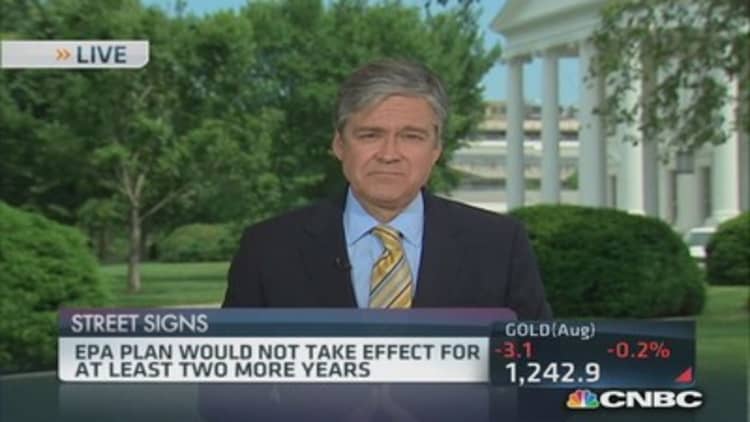As the Obama administration pushes a plan to reduce carbon emissions, some S&P 500 companies in conservative states are already adapting their businesses, according to a new report released Tuesday.
Republicans and the coal industry are among those that oppose President Barack Obama's effort to lower power plant emissions. But Carbon Disclosure Project's report suggests some nonpartisan support at the state level for tackling climate change, which some dispute is not human-induced.
The public companies in the study—from Texas energy firms to California tech leaders—are big job creators, and are integrating climate change into business strategies. They're lowering their carbon footprint by reimagining everything from laundry detergent to building insulation.
Read MoreHow beer innovation just might save the planet
"What we're finding clearly is that businesses all across a variety of states, across the political spectrum, see climate regulation as good for businesses," said Tom Carnac, president of the Carbon Disclosure Project in North America.
In other words, dealing with climate change—that can include securing future water supplies and removing manufacturing plants from the riskiest environments—is now a cost of doing business.
Job killer or creator?
The report, which assesses companies and the environment, examined 172 S&P 500 companies in nine states—both in conservative states and liberal-leaning ones. The states highlighted were: California, Colorado, Michigan, Minnesota, North Carolina, Ohio, Pennsylvania, Texas and Virginia.
The proposed Environmental Protection Agency regulations, announced a week ago, are intended to cut carbon pollution from U.S. power plants by 30 percent by 2030. And instead of imposing a blanket standard, the rules allow states to reduce emissions based on a list of options.
"The ball is in the court of the states," said Carnac with the Carbon Disclosure Project.
Not all agree that the proposed rules are good for business, and some describe them as job killers. The "regulations issued by EPA add immense cost and regulatory burdens on America's job creators," said U.S. Chamber President and CEO Thomas J. Donohue, in a prepared statement. "They will have a profound effect on the economy, on businesses and on families."
But Carnac notes some corporate leaders already are taking statewide, leadership roles in climate change.
The carbon project conducts extensive analysis of climate-change measures among public companies. The project's analysis is the latest report to show human-induced weather shifts already are being felt. Water is more scarce in some places, while it's raining more in others. Heat waves are growing in frequency and severity. Wildfires are intensifying.

Water, utilities and energy are among sectors that immediately would be affected by severe weather changes.
Of the 11 Texas energy companies studied in the paper, nearly all reported they have incorporated natural gas, wind or solar power into their energy mix. Companies including Consol Energy and Spectra Energy have made big investments in renewable and alternative fuel sources.
And ahead of the proposed plan to cut carbon pollution from power plants, utilities like Arlington, Virginia-based AES Corporation and San Diego, California-based Sempra Energy are generating more power from renewable sources such as hydro, wind and solar.
California to Virginia
Beyond the energy sector, states that have experienced severe weather disasters are preparing for a low-carbon economy.
Read MoreClimate change could reduce food supply, report says
In Virginia, for example, Hurricane Isabel in 2003 resulted in $1.2 billion in economic losses. MeadWestvaco, a packaging company based in Richmond, Virginia, has subsequently identified about 22 manufacturing facilities in locations that are vulnerable to catastrophic windstorms and flooding, according to the report.
Across the country in California, information technology companies such as Hewlett-Packard, based in Palo Alto, are pursuing energy efficient options. For example, HP has invested in a modular, efficient data center that uses less energy than traditional brick-and-mortar data centers, according to the report.
In California, where severe drought and wildfires already have wrecked havoc, about 15 percent of the state's companies have invested 15 percent of capital expenditure on reducing emissions and targeting energy efficiency.
Climate change stakes, meanwhile, only are rising.
A day after the U.S. announced plans to reduce carbon emissions at power plants, China—the world's biggest greenhouse gas emitter—stepped into the debate last week. China said it will limit its total emissions for the first time by the end of this decade, several news agencies reported. A major climate change conference is scheduled in Paris next year.


